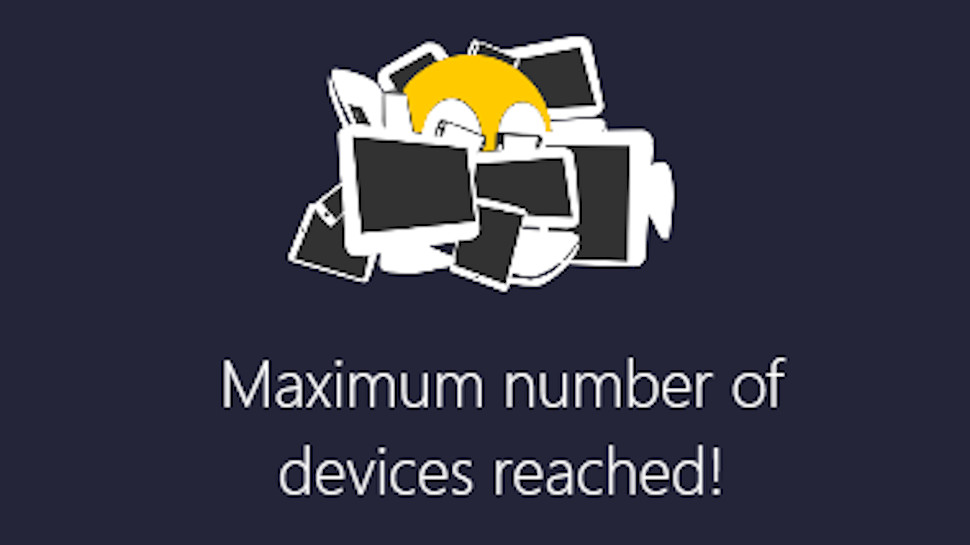Sign up for a VPN and you'll probably only have a couple of uses in mind. Unblocking US Netflix on your phone, maybe, and protecting yourself on public Wi-Fi.
But then you start to set up the service, and realize you could also use it on three smart TVs. And a couple of laptops. Another phone, maybe a games console, some tablets, and the list goes on.
This isn't a problem with VPNs such as IPVanish, Windscribe and Surfshark, as they don't have any specific limits on simultaneous connections. You can set up and use the service wherever you like.
With most VPNs, though, there are strict limits on the number of connections you can use at one time. These often look simple - the site might advertise 'supports 5 devices' - but beware, this doesn't always mean what you think. If you're likely to use a VPN with loads of hardware, it pays to find out exactly how your provider's rules work.
Simultaneous connections
Many VPNs limit access to a maximum number of simultaneous connections, typically between five and ten. That is, they don't care which devices are connected - phones, smart TVs, laptops or whatever - but you can only have a maximum of five to ten using the service at one time.
If a VPN really wants to impose a limit, this is simplest and most straightforward way to make it happen. You can still set up the VPN on all your devices, you don't have to tell the provider what they are, you just use them as you like. Easy.
Well, OK, maybe you'll run into trouble occasionally, if both smart TVs are running and the kids are using their tablets, too. But most of the time you're unlikely to have all these devices running simultaneously, the VPN will just work, and you won't have to think about connection limits at all.
This is how things work on many of the top VPN providers, including ExpressVPN and NordVPN.

Simultaneous devices
Some VPNs say they limit access to a number of devices. Confusingly, many providers use this as another way of describing a connection limit, presumably because they think it's simpler to understand. But others really do mean a device limit, and that works quite differently.
CyberGhost can be installed and used on seven devices, for instance. Sounds better than a five-connection limit, right? But the problem is these must be seven specific devices, and that can be much more of a hassle.
For example, suppose you set up a VPN with a five-connection limit on 15 different devices. The provider doesn't care about your hardware, so you'd have no problem connecting them all to the VPN, several times a day, just as long as you had no more than five connected at the same time.
Try this on CyberGhost, and you'll be able to connect the first seven devices without any issue. But when you get to device number eight, you'll see a 'Maximum number of devices reached!' alert, and have to log out of one of the previous devices before you can connect the eighth. Then you’ll have the same problem with device #9, #10, #11, and if you need to log in again using one of the earlier devices, and - you get the idea.
If you'll never use your seven-device allocation, that won't matter at all. But if you've got several cupboards full of hardware to protect, it could be a real problem. And one with far more potential catches than you might expect.
VPN device limit complications
One problem with limiting VPN access by device is the provider must come up with a way of recognizing which device you're using. That's more difficult than it sounds, and introduces various other annoyances and problems.
CyberGhost warns that if you reinstall its app or update your operating system, it'll be counted as a new device, presumably because the device identifier has changed. Now you've a single device taking up two of your slots, making it more likely you'll hit the limit. You can fix this by going to your web account and manually removing the duplicate, but it's a hassle you won't get with VPNs which use connection, rather than device limits.
Managing these device identifiers introduces a small privacy issue, too. Instead of just recording a total number of connections, the provider must keep a record of all your devices, allowing them to recognize which hardware you're using, and when.
When we last logged into our KeepSolid VPN Unlimited web dashboard, for instance, the service had logged our Windows laptop computer name, the name of the user account and the date and time we'd last logged in. There's not a lot KeepSolid can do with that, so it's not a significant concern, but it's still more logging than you'll get with many other VPNs.
Even if you can live with that, wait, we've not finished yet. There are more big device management gotchas waiting with some providers.

The KeepSolid conundrum
KeepSolid VPN Unlimited limits you to a maximum of five or ten devices (depending on your plan), which sounds very reasonable. But there's a catch. The company warns that the same device may be counted multiple times, and for reasons you might not expect.
Use your PC and connect via the VPN Unlimited app, say, and that counts as one device. Fine. But use the Chrome extension on the same device, and because that's a separate method of accessing the VPN, it counts as a second.
Suppose your 15-year-old then logs into their own user account, still on the same PC, and also uses the VPN on Windows. Oops, sorry, different user accounts as different devices: your family PC is now using three slots, all on its own.
So, if you both use the Firefox extension, too, that's your five-device limit all taken up by the same computer.
Think that sounds bad? You've not heard the best part (or maybe the worst.) While CyberGhost allows you to log in and remove any devices immediately, VPN Unlimited only supports removing one device a week. If you mess up like this, it could take a month to free up all your slots.
KeepSolid does offer one sort-of solution: you can pay to support more devices. Well, thanks. But no thanks.
(HideMyAss!, ProtonVPN and a few others also offer plans where you pay more to cover extra hardware. If you love the provider and that's all you need to make it perfect, it might make sense. But keep in mind that several VPNs now have no set device limits, and you're paying for something that comes for free elsewhere.)
How many VPN connections do you really need?
As we've seen, VPN access limits can be more complicated than you'd expect. But you don't have to get involved in any of the complexities, unless it's really necessary.
If you mostly only need a VPN to protect your phone when you're out and about, for instance, then these rules won't matter much. You're unlikely to hit any device or connection limit, whatever it is.
You could just choose a VPN with a very high limit. VyprVPN now supports 30 simultaneous connections, surely enough for any home. And, as mentioned above, many top providers are beginning to scrap the limits altogether.
If your preferred VPN says it has a device limit, check the support pages to see what this means. Normally they're just talking about simultaneous connections, which is easy to manage. But if you're limited to specific devices, then as we've mentioned above, that's more complicated. Find out how the process works, before you sign up.
Alternatively, if you're happy with your VPN but still run into a device limit occasionally, setting the service up on your router often makes life easier. You can then connect as many devices to the router as you like, but these only count as a single connection to the VPN, and only one of your device (or connection) allowance: much simpler.
- See how to install a VPN on your router
- Stream more with a working Netflix VPN
- Not sure about that provider? Quickly investigate your new VPN
from TechRadar - All the latest technology news https://ift.tt/3r3kvQL
Aucun commentaire: